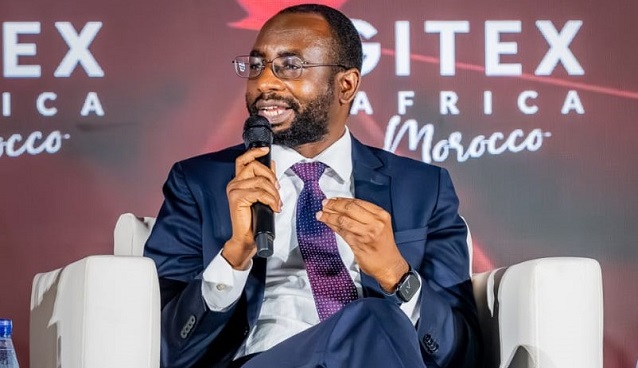E-Business
Software Practitioners Seek More Action on Local Content Policy in ICT

Software practitioners in the country were united on the need for federal government to expedite action on the implementation and enforcement of the various executive orders on local content at the 2018 president’s dinner of Institute of Software Practitioners of Nigeria (ISPON) held over the weekend.
Olorogun, James Emadoye, president, ISPON, said that the advancement of Nigerian local content in software development, in contracts, science and overall ICT space was essential yesterday, germane today and he has no doubt it will remain an indispensable factor in our history as a country, if we are to change the current reality where Nigeria is recorded amongst the poorest nations of the world.
“The most important resource in any endeavor has been widely recognized as the human resource. Every other resource, processes or even automation, in most cases, are objects that are under human control.
“We cannot thank God enough that he has endowed us with smart, strong and enterprising people. Other nations are looking for Nigerians in every sphere of human endeavor to help build their system.
“Nigerians are doing exploits in every nook and cranny of the world which of course has become a global village without boundaries, made possible by technology of which software is the domain,” he said.
According to him, ‘ISPON believes that Nigeria can record some significant achievement in the world software business and global market, if Nigerians support local content.
We must remove the conditional statement ‘if’, we must support Local Content; we must ensure that the letter and the spirit of Executive Orders 003 and 005 are brought to the fore and remain our guiding principles in all our business transactions, in the overall interest of our national development’.
He said that enforcing these presidential orders will require the utmost vigilance by all enforcement departments of government as well as security agencies.
“Active collaboration with professional associations like ISPON, NCS and CPN is also significant and required,” he noted.
He added that the recently signed Executive Orders by the president will finally begin to give local software industry and practitioners a chance to improve their skills and products with minimal stifling competition from foreign firms.
Emadoye however, called on the Federal Government to enthrone a National Software Policy Strategy and related Legislation and indeed, all well-meaning Nigerians to give the country a chance to develop for the sake of our children and the generation unborn.
“We just cannot continue the same ways that have failed us. It is time we change our ways. Software-Nigeria is the sustainable way forward for our national accelerated development in the knowledge economy which is currently driving the 4th industrial revolution,” he said.
Prof. Charles Uwadia, President and Chairman-in-Council of Computer Professional (Registration Council of Nigeria) (CPN), said that software is at the heart of information Technology and computing and that implementation of local content policy is very import because, it is about the future of our children.
“If we don’t implement it, we will continue to have brain drain in the country.”
Professor Adesola Aderounmu, President of the Nigeria Computer Society (NCS), said that software is going to rule the world and to this end government should create enabling environment for people to go into software development.
“Software development will help to solve unemployment in the country,” he added.
E-Business
Google Blocks 5.1Bn Harmful Ads in 2024, Suspends 39m Accounts

Google’s 2024 Ads Safety Report revealed how artificial intelligence is now a frontline defense against harmful online content, blocking 5.1 billion ads, restricting 9.1 billion more, and suspending over 39 million advertiser accounts, most before a single ad was shown.

The crackdown comes as scams become more sophisticated, with many leveraging AI-generated content or impersonating public figures.
Google’s advanced AI models, powered by Gemini, helped detect fraud faster than ever, spotting signs like stolen payment info, fake businesses, or coordinated scam networks.
In Africa, including Nigeria, the impact is especially important. Impersonation scams and misleading political ads remain a major concern.
In response, Google updated its Misrepresentation policy, deployed a team of 100+ global experts, and took down over 700,000 scam-related advertiser accounts, leading to a 90 percent drop in reported impersonation scams.
With nearly half the world voting in 2024, Google also removed over 10 million election-related ads for failing to meet transparency rules requiring verified identities and clear sponsorship disclosures.
In his reaction, Alex Rodriguez, general manager for Ads Safety at Google, said these numbers show what AI can do when it’s focused on safety.
“We rolled out more than 50 AI model upgrades in 2024, helping us act faster and smarter—stopping threats before users even saw them,” Rodriguez added.
While AI handles large-scale enforcement, human reviewers now focus on complex cases.
Google continues working with global regulators, industry partners, and organizations like the Global Anti-Scam Alliance to keep ahead of evolving threats.
E-Business
DG NITDA Tasks Africa to Lead the AI Revolution Through Strategic Leadership, Inclusive Innovation

The Director General of the National Information Technology Development Agency (NITDA), Kashifu Inuwa CCIE, has urged industry leaders across the continent to integrate Artificial Intelligence (AI) into their business, organisational, and operational models to unlock new opportunities, redefine leadership, and drive smarter decision-making toward making Africa deeply rooted in AI-driven innovation.

Inuwa made this call when he spoke on “Harnessing AI for Strategic Leadership” during a panel session at the Main State of the GITEX Africa 2025 held in Marrakech, Morocco.
The aim of the panel session was essentially to explore how data-driven and intelligence-led strategies can transform business models, optimise resources, and unlock new opportunities through AI-powered processes across various nations.
Speaking to an international audience of policymakers, technologists, and investors, the DG positioned Africa, particularly Nigeria as a rising force in the global AI landscape, championing a people-first and strategy-led approach to AI development and governance.
The DG argued that to be effective in today’s dynamic environment, leaders must evolve into AI-driven leaders and leverage technology not just as a tool, but as a partner in decision-making.
“AI is shifting the skills we value today, as well as the processes we use to do our daily work, so to drive strategic leadership, you need to be an AI-driven leader and find a way to use AI as a tool to create co-intelligence whereby you bring people and computers to work together to deliver your strategic vision as a leader,” he noted.
While urging leaders to combine AI with the unique strengths of their teams to deliver real business value, Inuwa stated that “Strategy must always come first, and technology second.”
He outlined four principles for effectively utilising generative AI which are inviting AI to the tale, maintaining human oversight, designing models with guardrails, and adopting a mindset of continuous improvement.
Inuwa explained that AI is invited to the table by giving it a role in organisational tasks, maintaining human oversight to correct bias and misjudgment, designing guardrails to ensure privacy ethics, and inclusivity, and adopting a mindset of continuous improvement by treating today’s AI as the least capable version that can be used.
He however warned against the risks of deploying AI systems built on data that fails to represent the diverse realities of global societies. Stressing the need for digital visibility of all cultures and citizens, he cautioned that if data doesn’t see a community, the system won’t see it either.
Introducing NITDA’s approach to governance in regulating AI through the Regulatory Intelligence Framework that is anchored on the 3 pillars of Awareness, Intelligence and Dynamism.
“In our approach to regulating AI in governance, we have a framework we call Regulatory Intelligence Framework, which as a regulator we need to be aware of the environment, we need to be dynamic because things change, and we also need to be intelligent. We need to know the data and make sense out of it,” he disclosed.
“Then we have 2 approaches, the first one is a rule-based where you can come up with certain guidelines and expect people to comply with them and we have a non-rule based, which allows them to build use cases, and based on those use cases, put the guard rails and agree on the best practices, which is always the best when it comes to AI governance,” he added.
Envisioning Africa’s AI future in the next 5 years, Inuwa painted a visionary picture where the continent will integrate AI into solving real-world challenges in every economic sector thereby leapfrogging development gaps.
Inuwa firmly averred that by augmenting human capability with AI, the continent can unlock unprecedented levels of innovation, efficiency, and inclusive growth.
“We missed the first, second, and third industrial revolutions, but this fourth one, we must lead it and not just follow.” He concluded.
Other industry leaders who shared their experiences and insightful ideas at the panel session were the Special Envoy on Technology, Republic of Kenya, Philip Thigo, CEO Pesalink, Gituku Kirika, and the Head of Africa, Open AI, Emmanuel Lubanzadio.
E-Business
NIPOST in Intensive Care, Needs Reforms Need to – Kekemeke

Nigerian Postal Service (NIPOST) is in Intensive Care Unit (ICU) and needs urgent reforms to revive it, according to Isaac Kekemeke, board chairman of the service.

Kekemeke, who spoke at a workshop organised for NIPOST staff in Abuja yesterday, added that it is now time to go the whole hog to reform and make NIPOST fulfill its destiny to compare and compete favourably with multinational postal agencies.
“The approach may not be palatable at all times but we need to take the tough but necessary decisions to exit the intensive care unit. We are either out of ICU in good health or head for the morgue. NIPOST either functions effectively now as a commercialised state operator or gets privatised, so that myself, the PMG, and a good number of you risk the loss of our jobs,” the chairman said.
No doubt, he added, “Change is not always easy as many loathe change because of the uncertainty it brings but it is in my place to urge you all to embrace the change we advocate.”

 Telecom3 days ago
Telecom3 days agoBanks, Telcos Mull New Billing Plans for USSD Airtime Payments

 E-Business3 days ago
E-Business3 days agoNIPOST in Intensive Care, Needs Reforms Need to – Kekemeke

 General News3 days ago
General News3 days agoFG Launches Survey to Encourage Nigerian Digital Firms Spread Across Africa

 E-Financial3 days ago
E-Financial3 days agoLeadway Partners Firm to Launch Retail Insurance Product for Women

 News3 days ago
News3 days agoDG NITDA Urges Foreign Investors to Tap into Nigeria’s Digital Future

 Telecom3 days ago
Telecom3 days agoMTN, Digital Encode, Back eBusinesslife Girls In ICT Campaign

 News3 days ago
News3 days agoEFCC Assures CBEX Investors of Fund Recovery Amid Investigation

 E-Financial3 days ago
E-Financial3 days agoSage Grey Finance Partners with Bank of Industry to Empower MSMEs in Nigeria

























